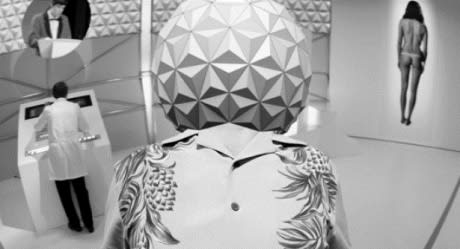Set entirely within the confines of Disneyland, Randy Moore's ambitious, extremely low-budget, directorial debut, Escape from Tomorrow, takes place over the span of a single day after family patriarch, Jim (Roy Abramsohn), learns that he's lost his job. Keeping the bad news to himself, Jim partakes in the usual Disneyland shenanigans with his wife Emily (Elena Schuber) and two kids.
Moore's approach to filming at Disneyland without any sort of budget or permit is that of erratic gonzo-style shooting. For the most part, he films his actors on the various rides, exploiting indoor tunnel locales where using a camera wouldn't be quite as suspect. Any comprehensive dramatic sequences are filmed in hotel rooms or in front of a green screen, giving the impression of staying within the vacuum of Disneyland, which is depicted here as a demonic prison and instigator of self-sustaining delusion.
As the title suggests, the magical kingdom built on fairy tales and rigid heteronormative ethos, is merely a vessel for reality avoidance. Though, as Jim attempts to indulge in the moment, the various animatronic characters and fellow Disneyland patrons distort into grotesque images, giving specious dimension—and resultant morality—to the dominant Western childhood fantasy.
Beyond the transformative nature of the Disney imagery displayed with black and white photography, Escape from Tomorrow deconstructs the nuclear family unit—from a primarily male perspective—positing Emily as a nagging shrew and Jim as a horny potential rapist, following around two underage French girls throughout the day. Taking his children along for the hunt, he forces them onto rides beyond their age bracket, concerned more so with the possibility of getting a little strange than for their well being.
It's here where this overly long and exceedingly messy comedy (sort of) dives into a surrealist template. Disney princesses are imposed with aberrant sexual implications and the Epcot Center is positioned as a giant testicular headquarters for draining male "essence." These diversions, handled with more of a sensationalist, perverted sensibility than artistic intent, help keep afloat what is ostensibly a repetitive, often strained, film about a man running around Disneyland with a hard-on.
Somewhere within the text is an astute observation about the mass delusion and ethical control that an entity like Disneyland imposes on the general populous, but it's mostly shadowed by male indulgence and an unnecessarily inflated running time.
Still, the sheer fact that this film exists, and was filmed on location, is quite impressive, which should help ensure that Escape from Tomorrow earns some sort of underground cult status.
(Mankurt Media)Moore's approach to filming at Disneyland without any sort of budget or permit is that of erratic gonzo-style shooting. For the most part, he films his actors on the various rides, exploiting indoor tunnel locales where using a camera wouldn't be quite as suspect. Any comprehensive dramatic sequences are filmed in hotel rooms or in front of a green screen, giving the impression of staying within the vacuum of Disneyland, which is depicted here as a demonic prison and instigator of self-sustaining delusion.
As the title suggests, the magical kingdom built on fairy tales and rigid heteronormative ethos, is merely a vessel for reality avoidance. Though, as Jim attempts to indulge in the moment, the various animatronic characters and fellow Disneyland patrons distort into grotesque images, giving specious dimension—and resultant morality—to the dominant Western childhood fantasy.
Beyond the transformative nature of the Disney imagery displayed with black and white photography, Escape from Tomorrow deconstructs the nuclear family unit—from a primarily male perspective—positing Emily as a nagging shrew and Jim as a horny potential rapist, following around two underage French girls throughout the day. Taking his children along for the hunt, he forces them onto rides beyond their age bracket, concerned more so with the possibility of getting a little strange than for their well being.
It's here where this overly long and exceedingly messy comedy (sort of) dives into a surrealist template. Disney princesses are imposed with aberrant sexual implications and the Epcot Center is positioned as a giant testicular headquarters for draining male "essence." These diversions, handled with more of a sensationalist, perverted sensibility than artistic intent, help keep afloat what is ostensibly a repetitive, often strained, film about a man running around Disneyland with a hard-on.
Somewhere within the text is an astute observation about the mass delusion and ethical control that an entity like Disneyland imposes on the general populous, but it's mostly shadowed by male indulgence and an unnecessarily inflated running time.
Still, the sheer fact that this film exists, and was filmed on location, is quite impressive, which should help ensure that Escape from Tomorrow earns some sort of underground cult status.
